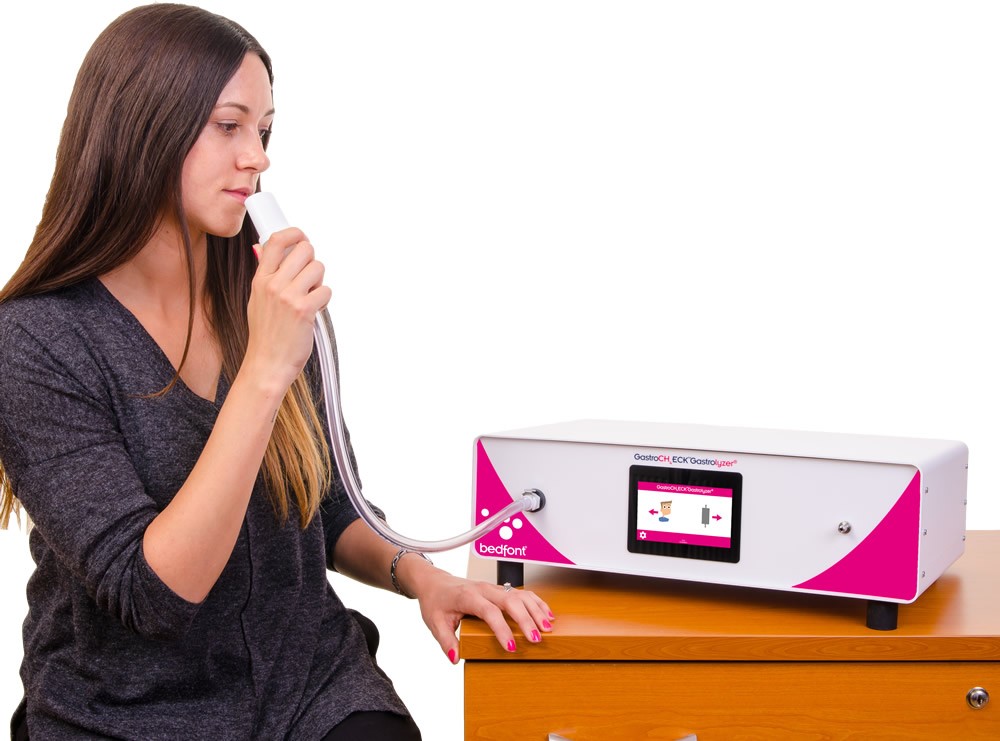Your Plan of Action – the natural approach
Watch carefully for triggers of symptoms
Check your symptoms against our list below
Discuss with your nutritionist whether the SIBO test will be the most useful for you or if you might benefit from a different digestive test
Follow our dietary and supplement recommendations to restore balance to the digestive tract and improvement of your health
Best test options: Breath test for Small Intestinal Bacterial Overgrowth
SIBO or Small Intestinal Bacterial Overgrowth is a common underlying cause of Irritable Bowel Syndrome (IBS). SIBO has been shown to be present in up to 78% of IBS cases. Given IBS affects 11% of the worldwide population, this is a truly remarkable number of people. IBS is likely multifactorial but many symptoms can be attributed to a bacterial overgrowth in the small intestine.
Causes of SIBO
Under normal conditions, most of the bacteria that live in our digestive tract occur much farther down, in the large intestine. Conditions here should normally prohibit bacterial overgrowth but our natural immune defences can be reduced by stress, some medications and antibiotics. The low pH of the stomach juices should also prohibit bacterial growth but this can be reduced due to reduced digestive capacity or medications such as proton pump inhibitors (PPI). When bacteria overgrow, they can sometimes travel ‘back up’ and inhabit the small intestine. This may occur after a physical upset to the digestive area such as surgery, a gastrointestinal illness or a weakness in the ileocecal valve where the small intestine joins the large intestine. Reduced motility is also a major factor, where food is not moving through the gut quickly enough.
Once in the small intestine, bacteria can ferment foods (mainly carbohydrates and specific fibres) before we have had a chance to digest them. They produce large amounts of gas and bi-products which can lead to the typical symptoms of SIBO.
Characteristic Symptoms of SIBO
- Acid reflux, heartburn, indigestion
- Feeling of food not going down
- Feeling full very quickly
- Bloating
- Feeling of a ‘blockage’
- Constipation
- Diarrhoea
- Irregular and changing bowel movements
Other symptoms and conditions that may be associated with SIBO
SIBO can also lead to damage to the delicate lining of the digestive tract leading to inflammation and leaky gut. This can give rise to a number of other conditions and symptoms
- Acne Rosacea, skin rashes, histamine-type reactions
- Anxiety
- Autoimmune conditions, possibly autoimmune thyroid conditions – and SIBO is more common if you have a hypothyroid condition
- Liver disease, non-alcoholic fatty liver disease, gall bladder problems and gall stones
- Chronic fatigue, fibromyalgia
- Malabsorption of nutrients can lead to deficiencies in iron, vitamin B12, calcium and other minerals. This can significantly affect energy levels and bone health
- Fat malabsorption is common which can lead to poor skin quality and hormonal imbalances, plus deficiencies in fat-soluble vitamins A and E
Can Nutrition Help?
Low FODMAP diet
If you suspect SIBO, you may already be aware of some triggers that make your symptoms worse such as wheat, garlic, onions, legumes like chickpeas and beans and cabbage. A low FODMAP diet might be recommended for you but we do not recommend starting this diet without supervision or before you have had a positive test.
FODMAP stands for Fermentable Oligosaccharides, Disaccharides, Monosaccharides and Polyols. These are types of sugars and carbohydrates found in many foods and are the favourite foods of bacteria in the small intestine. There is a long list of foods to avoid which has been created by Monash University based on many years of research. You should try to include as many foods from the allowed list as possible to try to maintain variety in the diet. It is often a pitfall of this diet – it may seem complicated to begin with but if you choose to only eat the same foods all the time for simplicity, you may be further starving out your good bacteria.
The bi-phasic diet, SIBO-specific diet, the Specific Carbohydrate Diet, the GAPS diet…
There are many other dietary combinations that have been devised to address symptoms of SIBO. Some of these diets are very restrictive and should not be carried out without supervision. The low FODMAP diet has the most research behind it and should be the first step taken if you have a positive SIBO result. If you still experience symptoms on this diet, your nutritionist will help you to eliminate further triggers.
Antimicrobials
Removing trigger foods will help to alleviate symptoms of IBS and SIBO but it will not solve the problem. Once you re-introduce foods back in, you may find your symptoms return altogether. In order to eradicate the overgrowth, you may need to use antimicrobial supplements.
Rifaximin is the most commonly prescribed antibiotic for SIBO. It is not like typical antibiotics in that it is absorbed mostly in the small intestine so it does not have the same negative effect on your good bacteria that we would normally associate with antibiotics. You would need to talk to your doctor about the suitability of Rifaximin for you.
Natural antimicrobials include extracts of oregano, garlic and grapefruit seed. In one study, a herbal formulation was shown to be more effective than Rifaximin. We have written a case study to show how a herbal formulation has helped one of our patients and this has been submitted for publication in a medical journal.
Maintenance
We recommend re-testing for SIBO after any protocol to ensure that is has been eradicated. If there is some still present, your nutritionist will advise you on a further protocol. You may then be able to re-introduce foods to your diet slowly without symptoms. However, SIBO has a high remission rate so it is very important to maintain gut health and most importantly, maintain movement of food through the digestive tract. This is called ‘gut motility’ and you will need to support the MMC – the migrative motor complex. You may be recommended supplements to support this such as ginger or a herbal tincture. We work with herbalist and pharmacist Niamh Boden to support our patients. Please note that many medications are contraindicated with herbs. Use of herbs must be appropriately supervised.
Tests
The test for SIBO is a simple non-invasive breath test. This looks for both hydrogen-producing and methane-producing bacteria in the gut. We work with our testing partners Gastrolife who are experts in this field. Gastrolife have clinics in Sandyford, Naas and Galway.
Preparation for the test is key to its success. Your nutritionist will guide you through preparation for this test so that results are accurate and reliable. Your nutritionist will also be able to interpret the findings – whether you are positive for hydrogen, methane or both – and this will determine the steps you will need to take next. A full and comprehensive protocol will be designed for you including dietary support, meal plans and recipes.
Where to start?
Watch for trigger foods in your diet – keep a diet journal with foods eaten and symptoms experienced. It can be hard to track symptoms just by memory alone. Discuss this with your nutritionist at your appointment as it may be that another digestive test would be more useful and informative for you.



